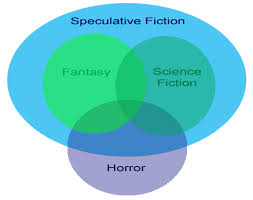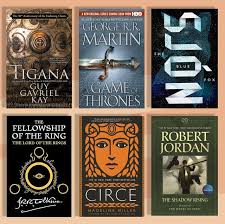The Fascinating World of Speculative Fiction
Speculative fiction is a genre that encompasses a wide range of imaginative works that explore potential futures, alternate realities, and fantastical elements. From science fiction to fantasy to dystopian tales, speculative fiction captivates readers with its creativity and thought-provoking themes.
One of the key aspects of speculative fiction is its ability to transport readers to worlds beyond their wildest imaginations. Whether it’s through advanced technology, magical realms, or post-apocalyptic landscapes, these stories challenge our perceptions of what is possible and invite us to ponder the complexities of the human experience.
Authors of speculative fiction often use their storytelling skills to address contemporary issues in a unique and engaging way. By creating fictional worlds that mirror our own or present exaggerated versions of reality, they offer insightful commentary on society, politics, and the human condition.
Speculative fiction also provides a platform for exploring philosophical questions about existence, morality, and the nature of reality. Through allegorical tales and intricate world-building, readers are encouraged to contemplate profound ideas and confront ethical dilemmas in a safe yet stimulating environment.
Whether you’re drawn to epic space operas, magical quests, or chilling dystopias, speculative fiction offers a rich tapestry of narratives that cater to all tastes and interests. With its boundless creativity and endless possibilities, this genre continues to inspire readers and writers alike to dream big and think beyond the confines of our current reality.
So next time you pick up a book labelled as speculative fiction, be prepared to embark on a journey unlike any other – one that will challenge your imagination, provoke your thoughts, and leave you pondering the infinite possibilities that lie within the realm of the speculative.
Exploring Speculative Fiction: Answers to 9 Frequently Asked Questions
- What is speculative fiction?
- What are the subgenres of speculative fiction?
- Who are some famous authors in the speculative fiction genre?
- How does speculative fiction differ from science fiction and fantasy?
- Can you recommend any must-read speculative fiction books?
- What are some common themes explored in speculative fiction?
- Is dystopian literature considered a form of speculative fiction?
- Are there any awards specifically dedicated to recognising excellence in speculative fiction?
- How has the popularity of speculative fiction evolved over time?
What is speculative fiction?
Speculative fiction is a genre that encompasses a diverse range of imaginative works, including science fiction, fantasy, and dystopian literature. It explores alternative realities, futuristic settings, and fantastical elements to engage readers in thought-provoking narratives that challenge conventional boundaries of storytelling. By delving into themes of possibility, innovation, and the unknown, speculative fiction invites us to contemplate the complexities of human existence while pushing the limits of our imagination.
What are the subgenres of speculative fiction?
Within the realm of speculative fiction, there exists a diverse tapestry of subgenres that cater to a wide range of tastes and preferences. From the futuristic landscapes of cyberpunk to the enchanting realms of high fantasy, each subgenre offers a unique blend of themes, settings, and storytelling conventions that appeal to different audiences. Whether you’re intrigued by the intricate politics of political fiction or drawn to the supernatural elements of urban fantasy, exploring the various subgenres within speculative fiction is like embarking on a journey through a multiverse of imaginative possibilities.
Who are some famous authors in the speculative fiction genre?
Within the realm of speculative fiction, there are several renowned authors whose works have left an indelible mark on the genre. Some of the most celebrated names include Ursula K. Le Guin, known for her groundbreaking exploration of gender and society in works like “The Left Hand of Darkness,” and Philip K. Dick, whose mind-bending narratives such as “Do Androids Dream of Electric Sheep?” have inspired generations of readers. Other notable figures in speculative fiction include J.R.R. Tolkien, creator of the iconic Middle-earth universe in “The Lord of the Rings,” and Margaret Atwood, whose dystopian masterpiece “The Handmaid’s Tale” continues to resonate with audiences worldwide. These authors, among many others, have shaped the landscape of speculative fiction with their visionary storytelling and enduring contributions to the genre.
How does speculative fiction differ from science fiction and fantasy?
Speculative fiction, as a genre, distinguishes itself from science fiction and fantasy by encompassing a broader scope of imaginative storytelling that includes elements of both genres while also exploring alternative realities, potential futures, and fantastical concepts beyond the confines of traditional genres. While science fiction often focuses on scientific advancements and technological possibilities, and fantasy delves into magical realms and mythical creatures, speculative fiction blurs the boundaries between these categories, inviting readers to contemplate hypothetical scenarios and ponder the implications of diverse speculative elements on society, humanity, and the world at large.
Can you recommend any must-read speculative fiction books?
When seeking recommendations for must-read speculative fiction books, one enters a realm brimming with boundless imagination and thought-provoking narratives. From visionary science fiction epics to enchanting fantasy sagas and gripping dystopian tales, the world of speculative fiction offers a treasure trove of literary gems waiting to be discovered. Whether delving into the futuristic landscapes of cyberpunk classics or exploring the magical realms of epic fantasy series, there is a wealth of captivating stories that promise to ignite the imagination and transport readers to extraordinary worlds beyond their wildest dreams.
What are some common themes explored in speculative fiction?
Speculative fiction delves into a myriad of captivating themes that ignite the imagination and provoke contemplation. From dystopian societies and alternate histories to futuristic technologies and supernatural phenomena, common themes explored in speculative fiction encompass exploration of power dynamics, ethical dilemmas, identity crises, and the consequences of human actions. Through these themes, authors challenge readers to question societal norms, ponder existential quandaries, and envision worlds where the boundaries of reality are stretched to their limits.
Is dystopian literature considered a form of speculative fiction?
Dystopian literature is indeed considered a form of speculative fiction. It falls under the broader umbrella of speculative fiction due to its exploration of alternative and often bleak futures that are imagined by authors. By presenting exaggerated or distorted versions of society, dystopian works engage with speculative elements to provoke thought and reflection on the potential consequences of current trends and behaviours. In essence, dystopian literature challenges readers to consider the possible outcomes of societal choices and serves as a cautionary tale within the realm of speculative fiction.
Are there any awards specifically dedicated to recognising excellence in speculative fiction?
Yes, there are several prestigious awards that specifically honour excellence in speculative fiction. These awards celebrate the outstanding contributions of authors, illustrators, and creators within the genre of speculative fiction. From the Hugo Awards to the Nebula Awards to the World Fantasy Awards, these accolades play a crucial role in acknowledging and promoting exceptional works that push the boundaries of imagination and storytelling. By shining a spotlight on the best and brightest talents in speculative fiction, these awards inspire creativity, foster innovation, and elevate the genre to new heights of recognition and appreciation.
How has the popularity of speculative fiction evolved over time?
The evolution of the popularity of speculative fiction over time is a fascinating journey that reflects changing societal attitudes and technological advancements. Initially considered niche and often overlooked, speculative fiction has gradually gained mainstream recognition and a dedicated following. With the rise of iconic authors like J.R.R. Tolkien, Isaac Asimov, and Ursula K. Le Guin, the genre has expanded its reach and diversified its themes to encompass a wide range of speculative subgenres. Today, with blockbuster film adaptations, acclaimed TV series, and best-selling novels captivating audiences worldwide, speculative fiction has firmly established itself as a beloved and influential literary genre that continues to push boundaries and inspire imaginations across generations.




